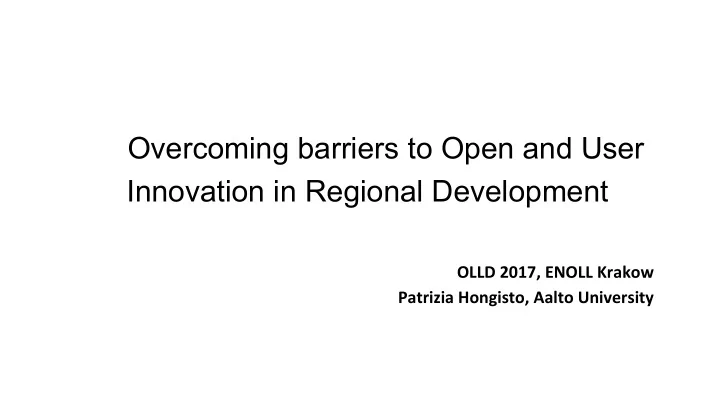

Overcoming barriers to Open and User Innovation in Regional Development OLLD 2017, ENOLL Krakow Patrizia Hongisto, Aalto University
OBJECTIVE • Expand the field of OI and UI through a ICT4D focus • LLs for OI Stakeholders and Users Orchestra>on in ICT4D • LLs for sustaining Emergent collec>ve crea>vity, Reflec>ve/ Reflexive prac>ces, Rela>onal competences • Is this possible in ICT4D?
QUESTIONS - I • How can LL prac>ces aKain and sustain regional development goals whether desired, or emergent? – Organiza>onal and consumer research perspec>ves of sustaining emergent crea>on – Collec>ve interac>on towards user-driven development and innova>on
QUESTIONS - II • What are the barriers to expected outcomes, e.i. to provide a market for global par>cipa>ng companies, and to expand local entrepreneurial ac>vi>es – Mul>-level goals nego>a>on – Ci>zens as individuals – Ci>zens as ‘working and living’ communi>es
INTERACTION AND RELATIONAL CAPABILITIES • OI in regional development – a collec>ve of stakeholders (incl. ci>zens) • UI in regional development – a community, or groups, of ci>zens who ‘ask, do, change’ • ICT4D – interna>onal development • OUI – LL – ICT4D
FINDINGS • Organiza>onal Barriers – Pre-set organiza>onal objec>ves – Ins>tu>onal organiza>onal limits – Divergent goals and collabora>on – Prac>cal inclusion and methodological prac>ce • Systemic considera>ons in ICT4D • Mismatch between conceptual understanding of LL and prac>ce in regional development
LL challenges in ICT4D • Managerial view is primary for organiza>onal stakeholders – doubts about open-ended processes – unease with redirec>ng interven>ons, funding complexi>es • Rela>onal, collabora>ve and reflec>ve/reflexive ac>ons indicate – lacking communica>ve resources for interac>ons (methodological) – lacking prac>ce orienta>on (epistemological)
FRAMING Push PlaBorms Pull PlaBorms Push-Pull NegoEaEons OPI4D
OPI4D Entrepre Network Participati Multi- neur. Use and Looping ed, on as layered Practice social demand Reflective initiative Meaning dynamic shared incentiv situated co- Design coordinati centric sustain. interacti reflective focus es/ innovati designed on ons process rewards on Open Participatory Innovation for Development
OPI4D Entrepr Initiatives Network Participati Use and Multi- Practice eneur. of ed, on as demand Reflective Meaning layered and social looping dynamic shared are co- Design centric incentives situated sustain. coordinati interacti reflective designed / rewards focus innovati on ons process on Centre Rewards Focus Innovation Control Network Demand Design Participation Alternating Multi- Innovation intrinsic layered centric Sustainable Interdepen extrinsic Co-created Negotiated initiatives Systemic Cyclic w w dent w w w w w w Rapid People w Positive Uncertain Open De- Emergent centreic Innovation incremental Modular sum centralized w w w w w w w Intrinsic w Anticipated Restricted Resource Efficiency Limited Top-down Procedural w Centralized
CONCLUDING THOUGHTS • Research in and on LLs is needed to – Understand meanings and efficiency in interac>ons and rela>onal reali>es in the prac>ce of LLs – Contribute (eg through ac>on research) to prac>ces in reaching reciprocal (business) opportuni>es – Produce valuable knowledge building prac>ces for a future where work, ‘a job’, either in developed or undeveloped environments, may have a changed meaning. • OPI4D is one way to shape this knowledge.
THANK YOU patrizia.hongisto@aalto.fi
Recommend
More recommend